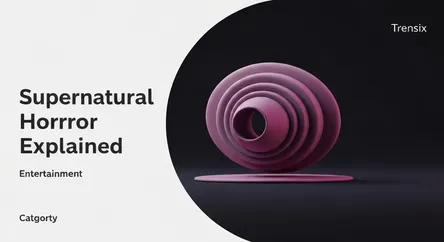Entertainment
Supernatural Horror Explained

Explore the chilling world of supernatural horror. Discover why movies about ghosts, demons, and curses are dominating the box office and our nightmares.
What is it?
Supernatural horror is a subgenre of horror film that derives its suspense and fear from otherworldly forces. Unlike slashers or psychological thrillers grounded in human evil, this genre focuses on threats beyond the natural realm, such as ghosts, demons, spirits, and curses. The core conflict often involves characters confronting entities that defy scientific explanation, forcing them to rely on faith or ancient rituals. Iconic examples range from classics like The Exorcist to modern franchises like The Conjuring, all united by their exploration of what lies beyond the veil of our reality.
Why is it trending?
Supernatural horror is experiencing a massive resurgence due to its ability to blend high-concept scares with profound human drama. Modern filmmakers are using ghosts and demons as powerful metaphors for grief, trauma, and societal anxieties. Successful franchises like The Conjuring Universe and critically acclaimed indie films like Hereditary have proven that audiences crave more than just jump scares; they want stories that explore deep-seated existential fears. This blend of the paranormal with relatable emotional struggles makes the genre incredibly compelling and ripe for fresh, innovative storytelling.
How does it affect people?
These films tap into our primal fear of the unknown and the question of what happens after death. By presenting threats that cannot be easily fought or understood, supernatural horror creates a unique and lingering sense of dread. For many, it's a cathartic experience, allowing them to confront concepts of mortality and evil from the safety of a theater seat. The genre often leaves audiences questioning their own beliefs and perceptions, sparking conversations about faith, spirituality, and the unseen forces that might shape our world. This profound psychological impact is why the stories often stay with us long after the credits roll.